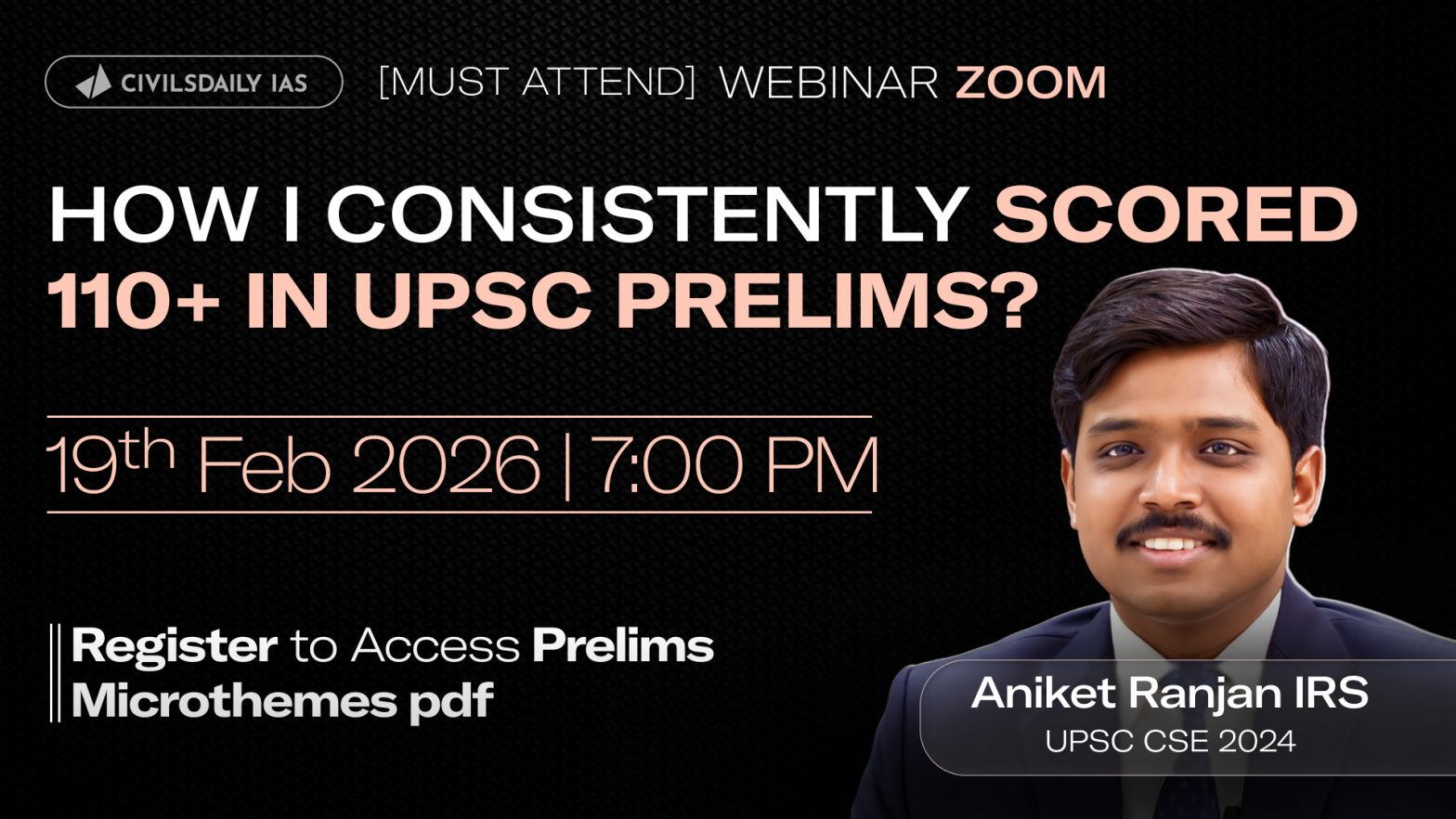





Burning IssuesInterview ProgramMotivation BytesPrelims DailyPrevious Year Question PaperProgram LaunchRanker WebinarsThe Hindu Op-edToppers TestimonialsUPSC Mains Topic-Wise PYQsUPSC PreparationUPSC SyllabusX Factor Notes
25th September
[Ethics Case Studies] Aptitude and foundational values for Civil Service
Syllabus mapping Paper 4 | Ethics, Integrity and Aptitude | Aptitude and foundational values for Civil Service Note4Students This initiative is a part of Target Mains programme for Mains 2017. You can post your answers in the comment section. But mentor review of answers will not be available. Just like various other CD community initiatives, this… Continue reading [Ethics Case Studies] Aptitude and foundational values for Civil Service
[Ethics Case Studies] Accountability and ethical governance
Syllabus mapping Paper 4 | Ethics, Integrity and Aptitude | Accountability and ethical governance Note4Students This initiative is a part of Target Mains programme for Mains 2017. You can post your answers in the comment section. But mentor review of answers will not be available. Just like various other CD community initiatives, this will also… Continue reading [Ethics Case Studies] Accountability and ethical governance
[Open Access] QIP videos for Geography Optional
We had run a special programme for Geography optional students known as Quality Improvement Programme under the aegis of K Siddhartha sir. Many students benefited from the program and have made their preparation more robust through these special sessions. CD is now opening up this initiative in order to benefit students who are writing Mains… Continue reading [Open Access] QIP videos for Geography Optional
[Ethics Case Studies] Emotional Intelligence
Syllabus mapping Paper 4 | Ethics, Integrity and Aptitude | Emotional intelligence- concepts, and their utilities and application in administration and governance Note4Students This initiative is a part of Target Mains programme for Mains 2017. You can post your answers in the comment section. But mentor review of answers will not be available. Just like… Continue reading [Ethics Case Studies] Emotional Intelligence
25 September 2017 | Prelims Daily with Previous Year Questions & Tikdams
Q.1) Which of the following is not a greenhouse gas generated from burning of the rice paddy fields? a) Hydrofluorocarbons b) Nitrous Oxide c) Methane d) Carbon Dioxide Q.2) ‘Balachandra & Ors. vs. Yedyurappa’ case of the Supreme Court was related to a) 8th Schedule b) 7th Schedule c) 10th Schedule d) None of the… Continue reading 25 September 2017 | Prelims Daily with Previous Year Questions & Tikdams
Liberalisation of the Indian Economy
India’s Balance of Payments India’s Balance of Payments: Current Account, Capital Account, Goods and Services Account India’s BOP Performance: Balance of Payment versus Balance of Trade, Current Account versus Capital Account FDI and FPI in India, External Commercial Borrowings, Foreign Exchange Reserves in India Foreign Exchange Rate Determination in India and Types of Exchange Rate… Continue reading Liberalisation of the Indian Economy
Inclusive growth and issues arising from it
Poverty in India Poverty in India: Types of Poverty, Causes of Poverty, Vicious Circle of Poverty Poverty Lines in India: Estimations and Committees Poverty in India: Trickle Down Approach, Inclusive Growth and Multi- Dimensional Poverty Index Addressing Poverty in India/Poverty Eradication Schemes Inequality in India Inequality in India: Definition and Measures; Lorenz Curve, Gini Coefficient,… Continue reading Inclusive growth and issues arising from it
Indian Economy and issues Related to Planning
Monetary Policy in India Monetary Economics: Barter System, Definition, Function and Evolution of Money Central Banking in India: Functions of RBI Monetary Policy in India: Inflation, deflation, Recessionary and Inflationary Scenarios Monetary Policy tools and Money Supply in India Monetary Policy Agreement in India Inflation Inflation in India: CPI, WPI, GDP Deflator, Inflation Rate Types… Continue reading Indian Economy and issues Related to Planning
Banking in India
Banking in India: Definition, Functions and Types of Banks Development Finance Institutions: IFCI, ICICI, SIDBI, IDBI, UTI, LIC, GIC Nationalisation of Banks Banking Sector Reforms in India: Narasimhan Committee 1&2, Nachiket Mor Committee, P J Nayak Committee Problem of Non Performing Assets in India Non-Banking Financial Companies in India Financial Inclusion in India: Need and… Continue reading Banking in India
Child Development Schemes
Child Development in India: Key Indicators- Infant Mortality Rate, Under Five Mortality Rate, Proportion of Children Immunized Child Development in India: Government Schemes and Initiatives Government Schemes for New Born Child
Government Schemes for New Born Child
Government Schemes for New Born Child and Child Health Facility Based New Born Care Facility Based New Born Care (FBNC) is one of the key components under the National Health Mission to improve the status of newborn health in the country. A continuum of new born care has been established with the launch of home… Continue reading Government Schemes for New Born Child
Child Development in India: Government Schemes and Initiatives
Government Initiatives for Development of Children in India National Policy on Children India is home to the largest child population in the world. Declaring its children as the nation’s “supremely important asset” in the National Policy for Children, 1974, the Government of India reiterated its commitment to secure the rights of its children by ratifying… Continue reading Child Development in India: Government Schemes and Initiatives
Child Development in India: Key Indicators- Infant Mortality Rate, Under Five Mortality Rate, Proportion of Children Immunized
Child Development in India Key Indicators for assessing Child Development Under Five Mortality Rate The Under Five Mortality Rate is the probability of a child born in a specific year dying before reaching the age of five. It is expressed as rate per 1000 live births. Majority of the under five deaths are neonatal deaths… Continue reading Child Development in India: Key Indicators- Infant Mortality Rate, Under Five Mortality Rate, Proportion of Children Immunized
Women Empowerment and Child Development
Women Empowerment in India: Gender Equality, linkage between Women empowerment and economic development, Indicators of Women Empowerment Government Policies towards Women Empowerment: Beti Bachao Beti Padhao, SSA, Kasturba Gandhi Balika Vidyalaya, Saakshar Bharat, SABLA, STEP
Government Policies towards Women Empowerment: Beti Bachao Beti Padhao, SSA, Kasturba Gandhi Balika Vidyalaya, Saakshar Bharat, SABLA, STEP
Government Policies towards Women Empowerment Sarva Shiksha Abhiyaan The principal programme for universalisation of primary education is the Sarva Shiksha Abhiyan (SSA), a Centrally-sponsored scheme being implemented in partnership with State/UT Governments. The programme has been in operation since 2000-01. The overall goals of the SSA are: (i) all children in schools; (ii) bridge all… Continue reading Government Policies towards Women Empowerment: Beti Bachao Beti Padhao, SSA, Kasturba Gandhi Balika Vidyalaya, Saakshar Bharat, SABLA, STEP
Women Empowerment in India: Gender Equality, linkage between Women empowerment and economic development, Indicators of Women Empowerment
Women Empowerment in India Gender Equality The first and foremost condition for Women Empowerment is to promote Gender Equality. Gender equality is a human right which entitles all persons irrespective of their gender to live with dignity and with freedom. Gender equality is also a precondition for development and reducing of poverty. Empowered women make… Continue reading Women Empowerment in India: Gender Equality, linkage between Women empowerment and economic development, Indicators of Women Empowerment
Education in India: Role and channels, Key indicators, Government policies
Education in India: Role and Channels in Promoting Economic Growth Education Development in India: Key indicators- Gross Enrollment Ratio, Primary Enrollment Ratio, Youth Literacy Rate Government Policies for Promotion of Education: RTE Act, Sarva Shiksha Abhiyaan, Mid Day Meal Scheme, National Youth Policy
Government Policies for Promotion of Education: RTE Act, Sarva Shiksha Abhiyaan, Mid Day Meal Scheme, National Youth Policy
Policy Initiatives of the Government in the Education Sector National Policy on Education 1986. A key milestone in India’s march towards Education for All was the adoption of the National Policy on Education 1986 (revised in 1992) which states “In our national perception, education is essentially for all”. Some of the key thrust areas of… Continue reading Government Policies for Promotion of Education: RTE Act, Sarva Shiksha Abhiyaan, Mid Day Meal Scheme, National Youth Policy
Education Development in India: Key indicators- Gross Enrollment Ratio, Primary Enrollment Ratio, Youth Literacy Rate
Education Development in India Key Facts and Statistics The essence of Human Resource Development is education, which plays a significant and remedial role in balancing the socio-economic fabric of the society. An all-round development of our citizens can be achieved by building strong foundations in education. Education is a unique investment in the present, bearing… Continue reading Education Development in India: Key indicators- Gross Enrollment Ratio, Primary Enrollment Ratio, Youth Literacy Rate
Education in India: Role and Channels in Promoting Economic Growth
Education in India Role of Education in Promoting Economic Growth and Development Positive Externalities from Education More educated individuals are usually more productive workers. Educated citizens are more informed and usually translates into more active voters. It is been observed that Educated Families have access to financial assistance through education grants and loans. Public education… Continue reading Education in India: Role and Channels in Promoting Economic Growth
Slide Anything shortcode error: A valid ID has not been provided






